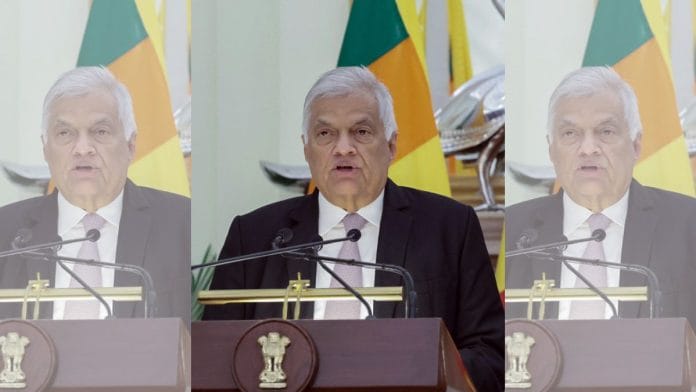New Delhi: Before flying down to India to attend Prime Minister Narendra Modi’s swearing-in ceremony, Sri Lankan President Ranil Wickremesinghe spoke about the influence of geopolitics and global rivalries that has turned the Indian Ocean region into the “Indo-Pacific”.
“Now, the maps are drawn not according to geography, but according to geopolitics. For a long time, we belonged to a region known as the Indian Ocean and all of a sudden it became the Indo-Pacific. That is [the result of] geopolitical cartography,” said the Sri Lankan president Friday. He was delivering a video address at a roundtable discussion on ‘Bay of Bengal and Indian Ocean Outlook’, hosted by a Colombo-based think tank called Geopolitical Cartographer.
Sri Lanka, a key partner for India in its neighbourhood amid a rising China, will hold presidential elections this year from 17 September to 16 October.
Local reports suggest Wickremesinghe will contest for another term, though this is yet to be confirmed. Public discontent against the previously ruling Rajapaksa family remains high in Sri Lanka, ever since the island country’s economic crisis triggered nationwide protests in July 2022.
The term ‘Indo-Pacific’ first gained steam in 2017, among American and Japanese officials. Notably, the US ‘Pacific’ Command was renamed the ‘Indo-Pacific Command’ in May 2018, at a time when US-China rivalry was intensifying under the Trump administration. Today, the US, the UK, several key European players and Australia have a dedicated ‘Indo-Pacific’ foreign policy strategy to counter a rising China, and for many, engaging India is crucial.
In his remarks at the roundtable, the Sri Lankan president noted the impact of geopolitics when it comes to borders in Europe.
“Europe has a problem now of where to draw the boundaries between Russia and Ukraine. It keeps changing and various claims are made. But we have to learn now that cartography depends completely on geopolitics and nothing else,” said Wickremesinghe.
The roundtable discussion also focussed on the emergence of new strategic alliances, freedom of navigation and how to combat “non-traditional threats” in the Indian Ocean region.
India’s Deputy High Commissioner to Sri Lanka, Dr Satyanjal Pandey, was present as well as diplomats from Indonesia, Thailand, Bangladesh and Australia. David Brewster, a Senior Research Fellow with the National Security College, Australian National University, and Dr Lailufar Yasmin, professor and chairperson of the Department of International Relations from Dhaka University were also present.
The discussion also focussed on Sri Lanka’s efforts to deepen the Economic and Technology Cooperation Agreement (ETCA) with India. New Delhi and Colombo re-launched negotiations for the ETCA last November, after the two countries had paused talks in 2018.
(Edited by Gitanjali Das)
Also Read: Rameswaram’s fisherfolk furious with Katchatheevu politics. ‘Don’t want island, just fishing rights’






